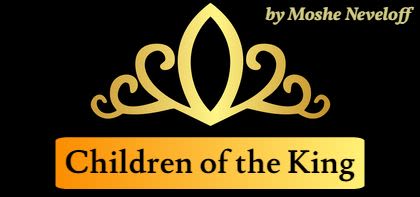
Devarim: Children of the King
The exile has exchanged us from being children of the King, to feeling like servants and slaves. The key to the redemption is reconnecting to our true status…

We have now begun the fifth and final book of the Torah, Devarim – Deuteronomy. This Torah portion is generally read during Shabbat Chazon – the Shabbat that falls before Tisha B’Av, and always during the Three Weeks of mourning (Bein HaMetzarim). As I mentioned previously, Rebbe Nachman teaches in the 7th lesson of Likutei Moharan, Part One, that the main expression of exile and the main reason we are still in exile is a lack of faith. When we don’t feel in any given moment that Hashem is with us, that everything we are going through is for our good, and that everything which happens has a purpose and reason, then we are in a state of exile and distant from our faith.
What are some different aspects of the exile? How does the exile express itself in our lives?
Rabbi Natan of Breslev teaches that the exile of the Jewish people, including being exiled from our land and treated in exile as second-class citizens and much worse, stems from the aspect of being exchanged. What does this mean? That the true children of the king were exchanged with the children of the maidservant, as Rebbe Nachman describes in his story The Exchanged Children. The Jewish people are the true sons and daughters of Hashem.
The main expression of our state of exile is the exile of our soul, which means that our souls are far from G-d and that we don’t feel that we are the children of the King. This state of exile, not truly knowing and living as the children of Hashem, causes all of the sins and physicality and negative desires which people fall into. Truthfully however, the main expression of kingship in this world belongs to the Jewish people, as we saw during the time of King David and King Solomon, and which we will see again with the coming of the Moshiach (Likutei Halachot, Laws of the Morning Blessings, 3rd teaching, according to Otsar HaYirya).
Rabbi Natan explains in another teaching that the main reason for the exile of the Jewish people in Egypt was due to strife (machloket). Yosef’s brothers argued with him, and eventually he was sold into slavery in Egypt. Afterwards, Yaakov and his family all needed to descend to Egypt, which is the opposite of the holiness of the land of Israel.
So too today in our times, the main aspect of exile stems from arguments and baseless hatred. Strife and hatred distances the Jewish people from the holiness of the Land of Israel, which is the aspect of peace and pleasantness. Therefore, concludes Rabbi Natan, before the final redemption Eliyahu the prophet will come to make peace in the world and amongst the Jewish people, because the redemption and the ingathering of the exiles depends upon peace (Likutei Halachot, Laws of Blessings on Fruits, 4th teaching, according to Otsar HaYirya). This is indeed exactly what Rabbi Arush is trying to do with his new campaign I Love Every Jew, whose goal is to increase peace within the Jewish people, and the world. Rabbi Arush has indeed seconded this comment recently, stating that everything is ready for the Final Redemption, except that we all need to be at peace with one another, and love each other, and stop fighting!
Rabbi Natan also teaches that the bitterness of the exile is due to sadness. Moreover, exile and sadness influence each other. When the experience of exile gets heavier and heavier, then sadness increases; and when sadness increases, this causes the exile to get worse. How can we escape the vicious cycle?
Rabbi Natan answers that our strength to withstand the exile and our hope to reach the redemption comes from the true tzaddikim. They shine to us hope and faith that the redemption will come. They know how to dust off our hearts, which is the sadness which overcomes our hearts, and help our hearts be ignited again to return to Hashem. They help us turn the sadness and depression into joy, and through this the redemption will come (Likutei Halachot, Laws of Giving Thanks, 6th teaching, according to Otsar HaYirya).
These teachings describe different aspects of how a lack of faith expresses itself in our lives and makes us feel distant from Hashem. Not living as the children of the King, and not feeling like His beloved children is an aspect of exile. Arguments and hatred stem from jealousy and other negative emotions and are caused by not seeing the other person with the light of faith. So too, sadness overtakes a person when they feel upset at what is happening to them, and they don’t see Hashem in their situation and in their lives. Sadness also causes us to feel disconnected from God.
Therefore, I think one of the main things we should be longing for during these weeks of mourning, and especially during the Nine Days and the fast of Tisha B’Av – is faith. This means longing and praying to feel Hashem’s presence, to feel and truly know that He loves us and is really so very close to us, even though we are still in a state of exile. To use this time to learn more about emuna, and pray to live our lives with more faith – more faith in Hashem, more faith in the tzaddikim who light the way for us, and more faith in ourselves.
“May it be favorable before You, Hashem our God, that You have mercy on us and all of the House of Israel your people, to plant Your faith in our hearts, and we will merit to believe in You and in Your true tsaddikim with complete faith; and our faith will be pure and correct without any blemish and without any confusion at all, God forbid; and we will merit in Your great mercy that our faith will be so strong, that it will be as if we see with our eyes Your Godliness and Providence and Your Glory, which fills all of the world…” (Likutei Tefilot, 7th prayer, Part One)
***
Republished with permission from breslov.blog.










Tell us what you think!
Thank you for your comment!
It will be published after approval by the Editor.